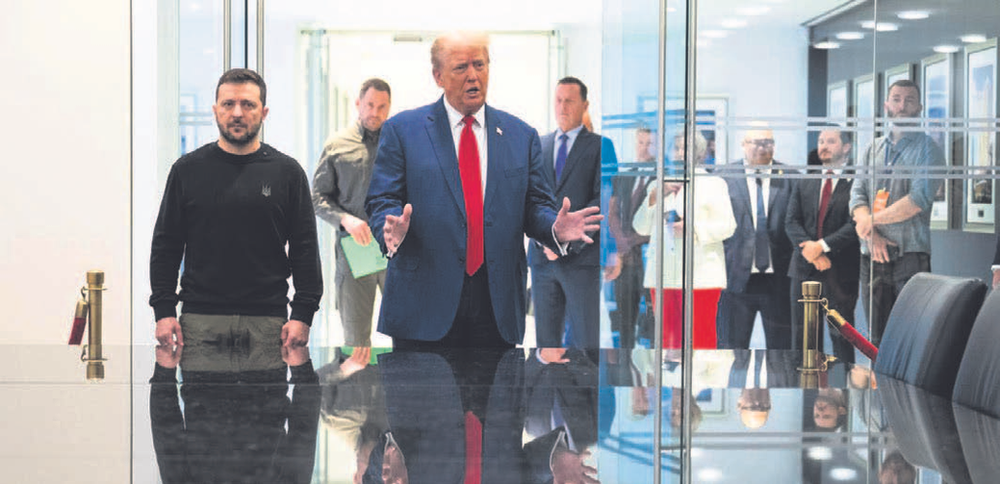
By Lara Jakes
A high-ranking military official from NATO indicated on Saturday that any peace agreement negotiated by President-elect Donald Trump that enabled Russian President Vladimir Putin to declare victory in Ukraine could compromise American interests.
In a comprehensive interview at a European defense summit in Prague, Adm. Rob Bauer, the Dutch head of NATO’s Military Committee, remarked: “If you allow a nation like Russia to emerge as the winner, what implications does that have for other autocratic governments around the globe where the U.S. also has interests?”
He continued: “Discussing Ukraine is significant, but the implications extend beyond just this country.”
Trump has repeatedly claimed that he could resolve the conflict in Ukraine within a day, without elaborating on how. A proposal mentioned by Vice President-elect JD Vance in September aligns with what Kremlin insiders suggest Putin desires: allowing Russia to retain the territories it has taken and ensuring that Ukraine will not join NATO.
Trump’s transition team spokesperson, Karoline Leavitt, stated he was reelected because Americans “trust him to guide our nation and restore global peace through strength.”
“Once he returns to the White House, he will take all necessary actions to achieve that,” Leavitt stated on Saturday.
Trump has consistently criticized the assistance the U.S. has provided to Ukraine — over $100 billion since February 2022, primarily in arms and military aid — and in a podcast last month, he blamed President Volodymyr Zelenskyy for Russia’s invasion, which he labeled “a loser.”
Bauer refrained from discussing the proposals put forth by the upcoming Trump administration, indicating he wished to observe what actions the former president would take upon his return. “It’s crucial not to draw conclusions based solely on what he has communicated so far,” he stated.
NATO was established in 1949 to counter the threat posed by the Soviet Union to the West, and Putin has long cautioned the alliance against encroaching near Russia’s borders. The United States is among NATO’s founding members, and its support was never questioned until Trump suggested during his first term that he might consider withdrawing from the alliance and accused other member nations of not contributing their fair share to defense expenditures.
Bauer, as NATO’s most senior military leader, also highlighted the serious geopolitical consequences of North Korea dispatching troops and armaments to assist Russia in its conflict with Ukraine.
“The world’s most isolated nation has suddenly become involved,” he remarked.
If North Korea’s assistance on the battlefield strengthens Putin’s position in negotiations, Bauer warned that other authoritarian leaders might feel emboldened to disregard international laws maintaining territorial integrity and economic sanctions. The fact that China, wielding significant influence over North Korea, did not intervene to stop this support for Russia presents a “perilous situation for the United States” moving forward, Bauer asserted.
The three-day conference in Prague, organized by the International Institute for Strategic Studies, a research institution based in London, concentrated on enhancing national military capabilities and the defense sector within Europe.
However, the potential for Trump to reduce U.S. support for Ukraine cast a shadow over the war effort and sparked new calls for Europe to reduce its longstanding reliance on American security assurances and weaponry.
While most speakers were careful not to predict the precise course Trump might pursue, there was a prevailing sentiment that Europe should gear up for the worst-case scenario.
“We will have to wait to see what the new administration’s actual policies will be concerning Ukraine, Europe, and NATO,” President Petr Pavel of the Czech Republic stated on Friday at the summit. “But undoubtedly, we will need to start” collaborating more closely across Europe, he added.
Whatever arrangement Trump endeavors to make with Russia to conclude the conflict, Pavel cautioned, “it will likely not align with our interests or those of Ukraine.”
Trump and Zelenskyy held a phone conversation on Wednesday, which was also attended by Elon Musk, the technology magnate whose satellite communication company Starlink has been instrumental in supporting Ukraine’s military efforts.
In Prague, officials largely concurred that Europe must enhance its self-defense capabilities and develop its own armaments. However, there were widespread concerns about balancing the substantial costs of militarizing forces against the growing economic deficits across Europe and the potential for a Trump administration to impose steep tariffs on European imports.
NATO nations in Europe have raised their national defense spending by 50% over the past ten years, according to IISS. Now, more than 23 of NATO’s 32 members allocate at least 2% of their gross domestic product towards defense, up from merely six nations in 2021. Nevertheless, numerous officials at the conference expressed that allies should aim to increase spending to as much as 3% or 4% in the coming years.
